The Old Pharmacy Providing Healing to Locals
Text - Yu Ju-Ling(游如伶)
Photography - Tsai Yao-Cheng(蔡耀徵)
Memories of Beitou by Chen Kuo-Liang, Second-Generation Owner and Proprietor of Changshengtang
Changshengtang Chinese Pharmacy, located near Beitou Market, was established in 1959. When founder Chen Chao-Ming, was operating the pharmacy, Beitou was experiencing an era of prosperity not seen since the end of the Second World War. Hot springs not only cleansed the worries of tourists, but also nurtured various industries. In the context of this period, Chinese pharmacies not only provided prescriptions to heal patients’ bodies, but also developed a unique culture in Beitou through their relationships with hot spring hotels, restaurants, martial arts halls and other industries.
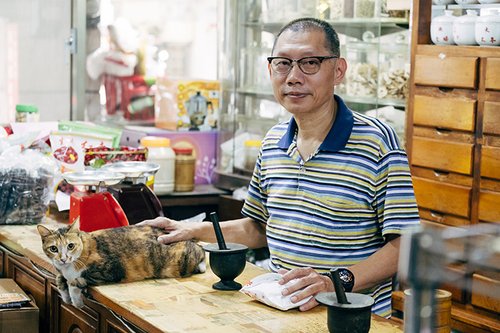
Photo: Chen Kuo-Liang, the second-generation owner and proprietor of Changshengtang Pharmacy in Beitou.
From the Pharmacy to the Kitchen, Medicated Diet Recipes Delivered in Person on Schedule
In the 1960s to 1970s, every evening before hot spring hotels opened for business at 4 or 5 o'clock in the afternoon, the chefs of the hotels would call the Chinese pharmacies to purchase medicinal ingredients needed for the night. Chen Kuo-Liang, still a middle school student at the time, would assist with delivering medicated diet recipes made by his father. Stepping on his Lucky brand bicycle's pedals, he would travel along Wenquan Road or Guangming Road to the various hot spring hotels located by the mountain, and hand the medicinal materials to the chefs. The medicinal ingredients were combined with other fresh produce purchased in Beitou Market to create nourishing dishes such as braised soft-shelled turtles, wine cooked chicken soup and other popular delicacies known for their healing properties.
“Beitou was very lively at that time, with as many as 100 hot spring hotels, which meant I was often delivering medicinal ingredients for entire days.” Chen Kuo-Liang recalled that the sense of endless prosperity was high at the time. Aside from the high demand for medicinal ingredients, there were also many customers which sought to purchase health-enhancing medicinal wine and hangover remedies. In 1979, when Beitou's prostitution-abolition policy was officially announced and enacted, Chen Kuo-Liang, now a high school student, had advanced his means of transportation from a Lucky brand bicycle to a motorcycle. Allowing him an even larger delivery route which covered hundreds of hotels and restaurants. However, the drunken remarks heard outside the hotel booths, the sound of Nakassi bands playing music, and the beautiful figure of waitresses glimpsed in the elevators during his deliveries, would mark the last days of the so-called “tender land” in this transition period of policy.
After the abolition of prostitution, the hot spring hotels in Beitou gradually declined, a sharp contrast to the previous period of prosperity. Even so, the medicinal ingredients continued to nourish the bodies of the residents of this tranquil mountain town. Chen Kuo-Liang recalled that from the 1980s to the 1990s, Beginning of Winter was the busiest time of the year for their Chinese pharmacy. Every household would go to the pharmacy to buy medicinal ingredients. Today It is rare to find such care and dedication in shopping around and cooking such ingredients, but for the past three to four decades, the smell and taste of medicinal items from the Changshengtang Pharmacy is one memory shared by many residents of Beitou.
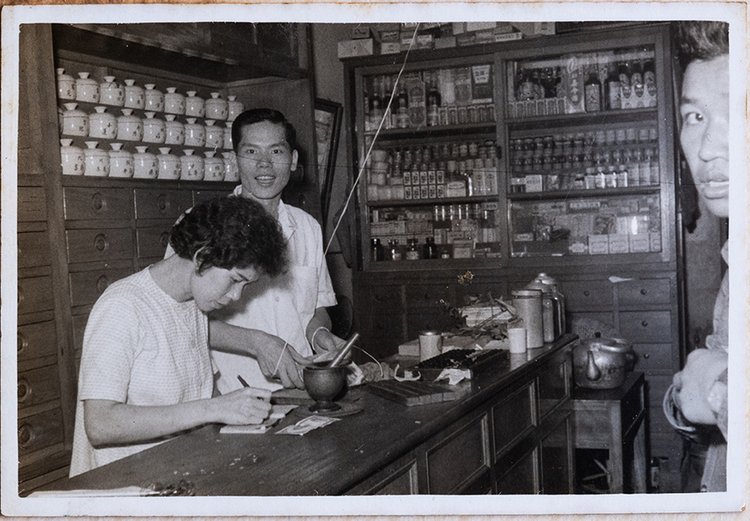
Photo: Chen Chao-Ming (middle), founder of Changshengfang Pharmacy, and his wife, Yang Chiu-Hsia (left), circa 1960s.
Keeping the Neighbors Healthy in An Era that Lacked Medical Resources
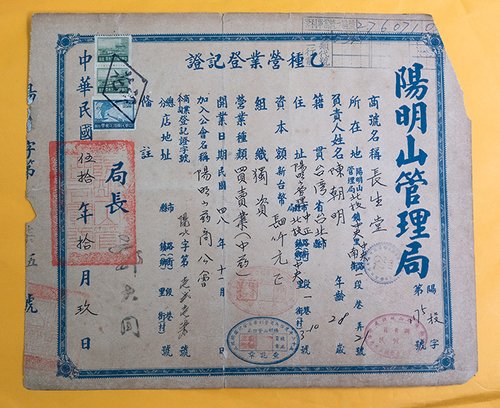
Picture: Type B business registration certificate issued by the Yangmingshan Administrative Bureau.
In the past, the Beitou Lion dance formation culture was quite prevalent. The high risk of suffering injuries to muscles and bones when practicing martial arts often resulted in visits to martial arts halls that specialized in traditional medicine, which also proved beneficial to related industries. Aside from assisting their patients with chiropractic treatments, martial arts halls would also request Chinese pharmacies to make medicinal herbal plasters, prepare medicinal powders and medicinal washes[1], as methods of extending patients’ treatments once they returned home. “In the old days, there was no need for signs for martial arts halls. Three or four medicinal herbal plasters simply hung on the red-bottomed wood boards in front of their doors. From a distance, you could tell that it was a martial arts hall.”
At that time, many people also turned to “tshiah-kha-sian-á” or quack doctors, individuals who engaged in medical practice but did not have the relevant training or licenses. “In the past, there were many ‘tshiah-kha-sian-á’ in Beitou, they often possessed some basic knowledge of herbal medicine, giving Chinese medicine prescriptions to patients, while also asking them to go to a specific Chinese pharmacy to buy the items prescribed.” Whenever a customer comes to the door with a prescription, Chen Kuo-Liang would deliberately ask a few more questions to understand the patient's symptoms and correct the content of the prescription prior to handing off the items.
Chen Kuo-Liang mentioned that in the past when medical care was scarce and life was not easy, some martial arts halls and quack doctors produced less than satisfying results for patients. By assisting with reviewing prescriptions, the pharmacy became an important pillar of local medical care.
[1]Medicinal washes were usually healing wines made for external use. In order to relax the meridians and activate blood, they were made by soaking medicinal materials and rice wine for two or three months and used for massage. In the past, it was not only needed by the martial arts halls, but also bought by the general public at the Chinese pharmacies.
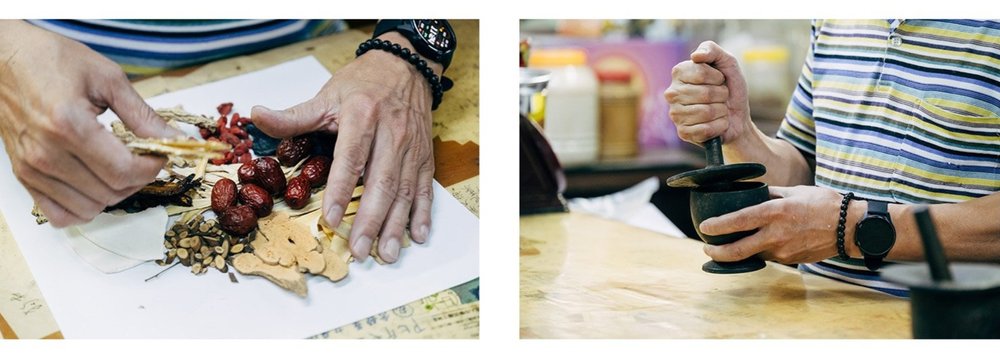
Left Photo: Every time a customer comes to the door, Chen Kuo-Liang would chat up and try to understand the symptoms, then adjusting the content of the medicinal materials accordingly.
Right Photo: The old pestle and mortar for pounding medicinal items is perhaps one of the most important items of the pharmacy.
The Taste of Oranges, Affections and Friendships in Beitou
The Changshengtang Pharmacy was almost providing its services to the community all year round, opening at 7:00 in the morning, while tending to people knocking on the door late at night for help. With the increased access of medical resources and the decline of the traditional medicine industry, Chinese medicine pharmacies that used to prescribe medicines and treat diseases have faded out of people's lives. However, the Changshengtang Pharmacy, as always, is open for business even during the Lunar New Year. The rows of chairs in front of the counter and by the wall are always full of people drinking tea and chatting, including local residents, as well as elders that traveled far from Datun Mountain.
“People can rest, but shops cannot, because many elderly people on the mountain would have nowhere to go.” Chen Kuo-Liang recalled that when his father ran the pharmacy, they would serve farmers who rest in their shop with tea. Every day at three or four in the morning, farmers living in Datun Mountain have to travel to the Beitou Market to sell vegetables. Once their selling at the market had concluded, they would go to the pharmacy to rest and chat. At that time, the Datun Mountains was known for oranges. When the oranges were harvested, the farmers would go to the Changshengtang Pharmacy to distribute pots full of oranges as the first stop on their journey.
“People attached great importance to friendship and courteousness. They felt that since they often rested and drank tea with you, the crops they planted should also be shared with you. Often gifting a fresh batch of oranges even before they were sold.” After Chen Kuo-Liang took over the pharmacy, his father's old customers and friends still made the journey to drink tea every day. Now he also collects the dregs left over from cooking the medicinal herbs and distributes them to farmers on the mountain as fertilizer. In return, these farmers would also give their produce to him once harvested. Vendors in the Beitou Market, the farming families in Datun Mountain and the Changshengtang Pharmacy have known each other for years and have thus developed a unique relationship.
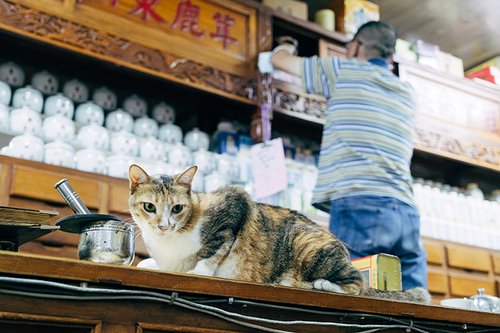
Photo: The Changshengtang Pharmacy’s cat “Douhua” in the is also an important character of the community which accompanies the local residents.
The Simple Daily Life of Enjoying the Hot Springs Nearby
In the early years, there were many hot spring hotels in “Xin (New) Beitou”, and it has since been transformed into a resort for out-of-town bathers. The “Old Beitou”, which is located to the south of Huanggang Creek and where the Changshengtang Pharmacy is located, retains the ancient style of public baths. The simple public bathing hot spring is a fixture of daily life.
“In the past years, because many households did not have a water heater at home, water had to be boiled for bathing. Thus, many people would bring their own washbasins, towels and other bathing items and go to a nearby public bath to take a bath.” Chen Kuo-Liang talked about the “Beitou Green Sulfur Spring”[1] and “Pearl Cool Bath”[2] that he used to go to when he was a child. Both located on the lively streets and easily accessible, these bath houses are closely connected to the lives of the residents, making them part of the collective memory of the old Beitou residents.
In the past ten years, tourists have come to Beitou to soak in hot springs. In addition to white sulfur springs and green sulfur Springs, Chinese medicinal bathing has also become an emerging choice for hot springs. Changshengtang Pharmacy is cooperating with the Beitou Hot Spring Museum to provide Chinese medicinal bathing recipes, which will be used in the public bath cultural exchange activities between the Beitou Hot Spring Museum and Tokyo Inari Spring in 2022, so that Japanese bathers can also experience the soothing qualities of Beitou’s hot spring culture. The local old pharmacy that not only heals the body with medicinal prescriptions and nourishes the stomach with medicinal diet recipes and ingredients, is now also using its Chinese medicine expertise in combination with hot springs to continue its legacy of healing this century-old small town.
[1]The “famous Beitou Green Sulfur Spring” is also called the "Three Coins Bathhouse". It is located at No. 12, Section 1, Zhongyang North Road, Beitou. It remains a location which some community elders visit on a daily basis.
[2]The "Pearl Cool Bath” used to be located at No. 1 Gongguan Road in Beitou. It is now closed and is privately run by a family. The hot spring water provided is green sulfur. Although the business permit of Yangmingshan Administrative Bureau was obtained in 1950, the actual opening date can be traced back to the Japanese era, according to subsequent owners.
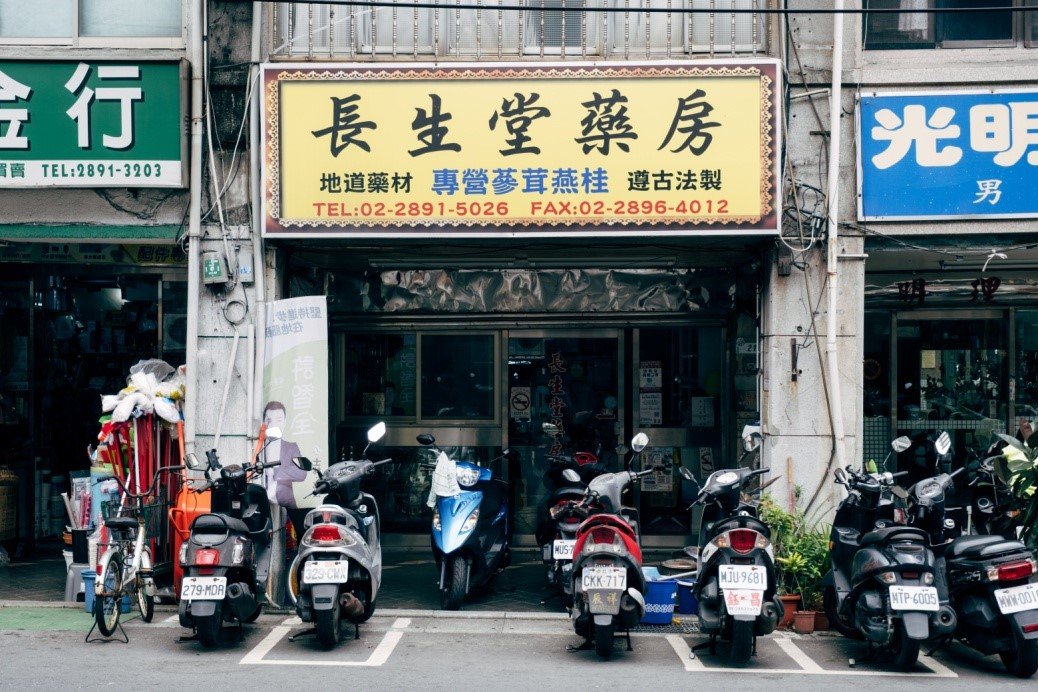
Photo: The Changshengtang Pharmacy is a place for local residents to drink tea and chat with one another.
